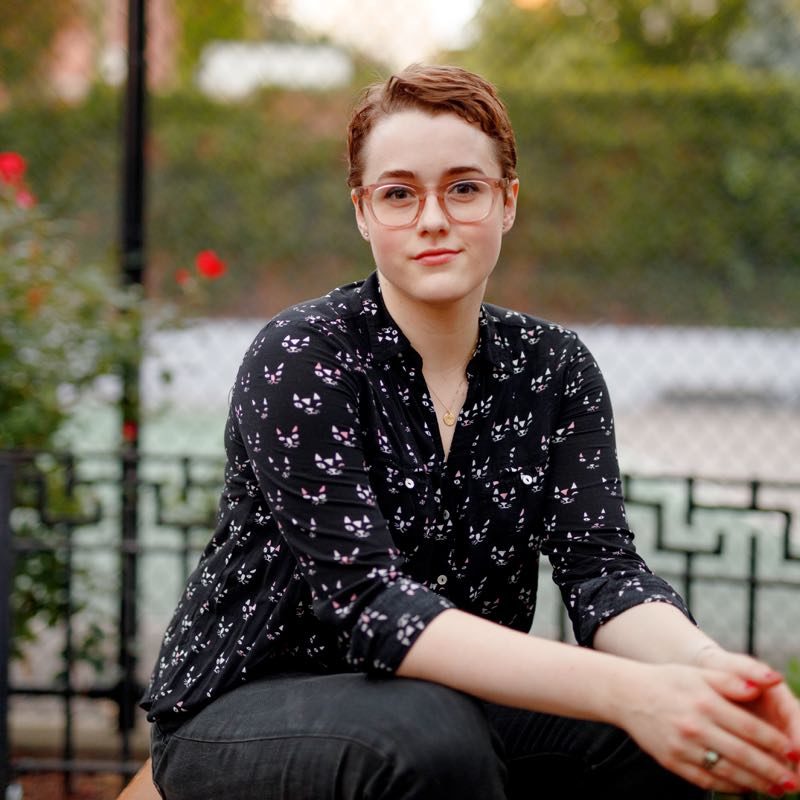Caitlin Kinnunen on The Prom and More
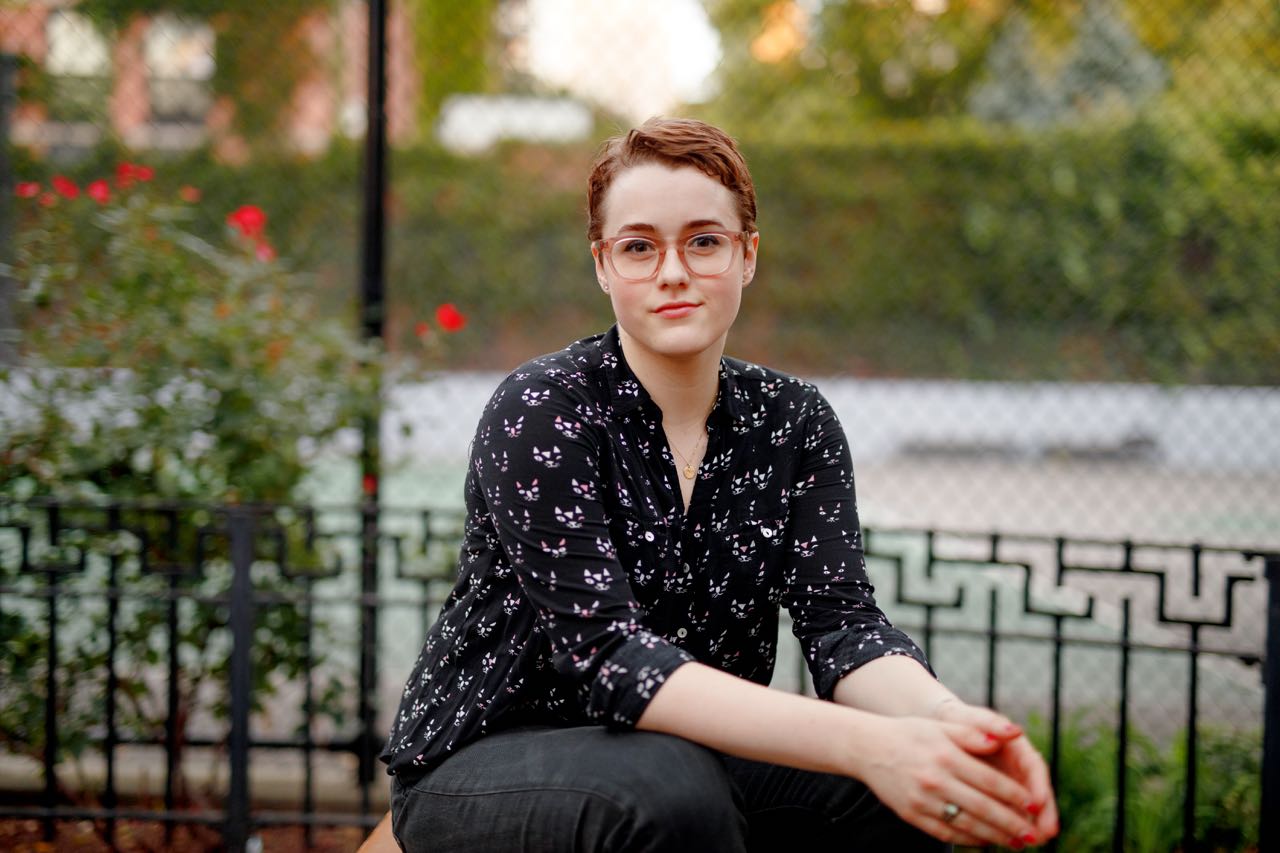
Written by Victoria Myers
Photography by Jacqueline Harriet
November 5th, 2018
In the new musical The Prom, a teenager, Emma, wants to take her girlfriend to the high school prom. Only the school doesn’t want to let a gay couple attend. The controversy brings a bevy of Broadway actors to town as they try to prove they are not narcissists. The show, which is based on numerous true stories of discrimination from around the country, is the rare original musical comedy. It’s also Caitlin Kinnunen’s first lead role in a Broadway musical. Caitlin has been working professionally since she was eleven, later making her Broadway debut in Spring Awakening and appearing again on Broadway in The Bridges of Madison County in 2014. She’s been with The Prom from its early workshops, to the out-of-town production, and now Broadway. During her final week of rehearsal for the Broadway production, I spoke with her about working on a timely musical, the responsibility of playing Emma, the pressure of Broadway, and more.
When you first got the part of Emma in The Prom and started working on it, what were the initial things about the character and the show that interested you?
When I initially auditioned for the role, I had no idea what it was. There was no information given out about the show really, and I actually auditioned for a different role. I went in and I read for the cheerleader-esque character. They very quickly were like, “Yeah, you’re not right for that. Let’s see you as this character, Emma.” I was like, “Great.” They had me read that side, but that still didn’t give a lot of information about what the show was. Everyone auditioning for it was like, “Oh, this is Mean Girls.” It’s not Mean Girls. I found out I’d booked this show, and I was like, “Great.” It’s amazing people, it’s incredible writers, and an awesome director. Clearly, it’s going to be good, but I don’t know what it is. I show up to the 29-hour reading that they did first, and it turned out to be this incredible story with these amazing, heartfelt, smart characters. It was exciting to be working on a new musical that actually meant something. A lot of the time you go and you work on things, and it’s always like, “Okay, well we’ll see how this goes. Who knows?” This one, right off the bat, was amazing and touching and an important story. Immediately, everyone gave it their all and were happy to be there.
Once you knew more about the show, did you feel like you immediately knew who Emma was, or did it take awhile?
Matthew Sklar, Chad Beguelin, and Bob Martin have all done an amazing job writing this piece, because the voice is so clear in it. There was never really a question of who this character was. She’s honest. She’s straightforward. She knows what she wants and she gets it. That’s refreshing, especially for a teenage role. It was really nice to be able to be handed this script and be like, “Oh, I immediately know who she is and what I can do with her.” This story is not based on one specific event, but it’s based on an event that happens everywhere, and quite often, unfortunately. To be able to do research on those different events, to see how it actually played out and what actually happened to kids in this situation, was heartbreaking, but also really informative. It was really easy to find out who Emma was and what I could do with her.
How do you like working on a character? Do you like working from a place where you feel like you are looking for the ways that the character is similar to you, or do you work more from looking at the ways that the character is different? Or none of the above?
I’m very text-based. I’ve never been one to try to find similarities or differences. It’s really about the text that is on the page and how you can make that person come to life. I don’t like to bring my own personal experiences in, because she’s not me. It’s this weird balance of not wanting to bring yourself into it, but automatically doing it anyway, because it’s you playing it. I just try to look at the text and see how to bring that to life without bringing any of my own baggage, but also bringing my personality to it. It was figuring out how a girl who’s 17 in this really small town would be dealing with all of this. I try to keep Caitlin out of it.
What has been the most surprising thing that you found during the rehearsal period and throughout the previous runs of the show?
How many people relate to it. I feel like I haven’t gotten the chance to do a ton of shows that people can relate to so strongly. The amount of interaction that I’ve gotten from people who have seen the show, people who have heard about it and said, “You’re telling my story!” has been shocking. I really think that has been fascinating throughout this entire experience. It has gone through waves over the last four years that I’ve been a part of it when it’s relevant, then for a while, it’s like, “Oh no, is it not relevant anymore?” Then it becomes relevant again. I think it’s the most relevant it’s ever been now in this climate and the fact that people can come and see [the show] and relate to it so strongly is special.
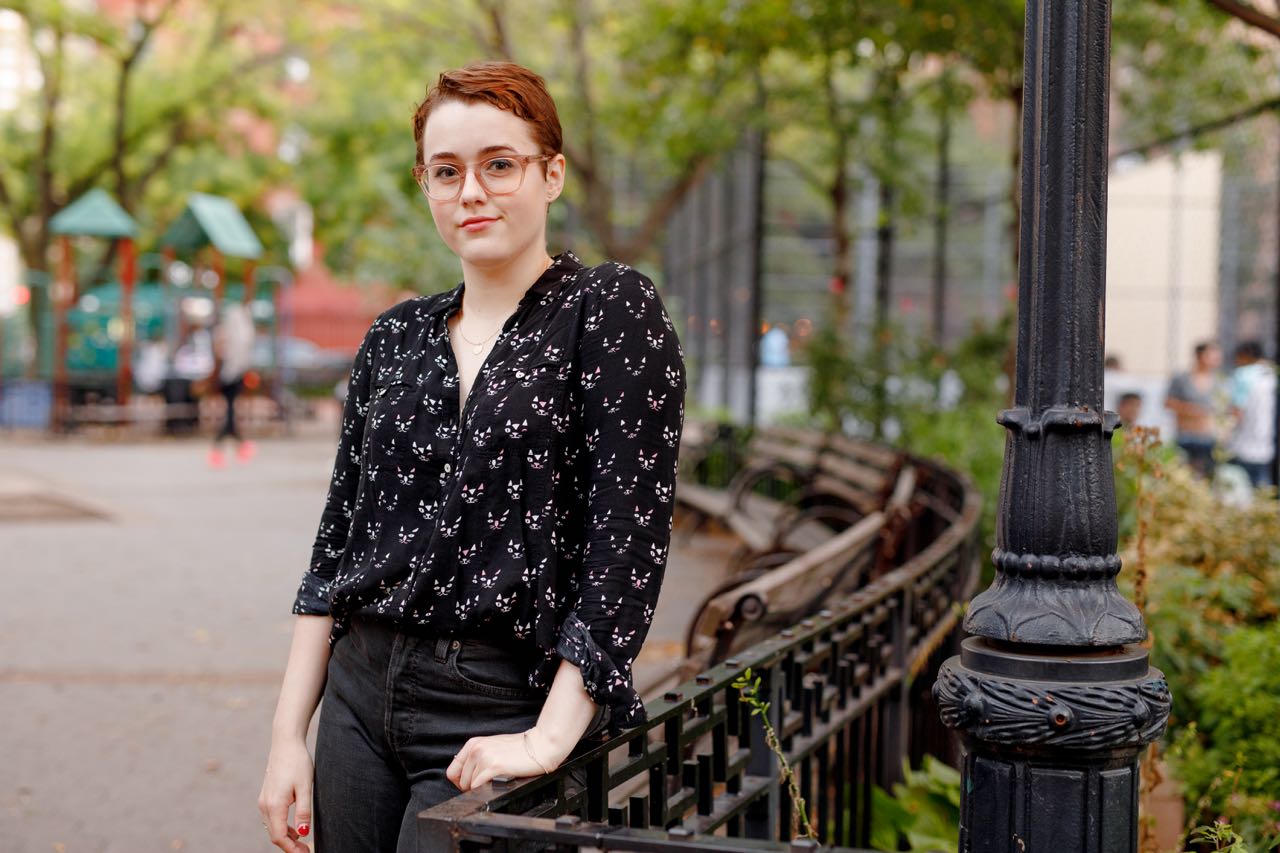
Given that the stories of gay people who are banned from bringing their dates to proms is not something that’s dramatized often (or at all), does that feel like pressure?
Yes. I feel pressure. Not bad pressure, but a good pressure, just in general with this show, because I’m representing a community that is not well represented in life, in general. I take that responsibility very seriously. I want to portray Emma as a real human being. I don’t want her to be a stereotype. I don’t want her to be false. I want her to be a real human being, who people can relate to.
Has there been a learning curve in figuring out how to deal with that aspect of it? Having people coming to you at the stage door and telling you their stories? I know cast members in other shows—like Dear Evan Hansen and Waitress—had talks about how to responsibly handle people wanting to tell them certain things at the stage door.
I think it’s been a lesson in just being an open human being with a good set of ears. I just have to take a backseat and listen. I have to be able to have these people come up to me and say what they need to say. I have to be able to listen to them and really hear them, because other people don’t. I think it’s been a lesson in acceptance and being present and being open, and really engaging with people no matter where they come from.
It’ll be interesting to see what happens once we’re open, when a lot of people can come and see the show, and what people say to me. I’ve been in other shows where that’s happened a little bit. It always is a very interesting process. You have to readjust to hearing that every day, because it can be hard. It can be hard having people tell you their life stories over and over and over again, when their lives have not been perfect. It’s great to be in the position where they feel comfortable coming to me and telling me that, because that’s what I want. I want people to be able to be comfortable.
This is also your first lead in a big Broadway musical. How has that been for you? Is that pressure, as well?
It’s something where I try not thinking about it. I’m like, “Let’s just go on this rollercoaster and see where it takes me.” I’m really lucky that I have an amazing cast and creative team, who are really supportive in everything I do. I know that they have my back. I try not to let my mind get ahead of itself. I just focus on the here and now and try to be appreciative of the opportunity I’ve been given. It may not happen again.
When you’re doing a Broadway show, there’s so much more than just doing the show. You end up having a whole other part of your job that’s doing press and things like that. A lot of actors have said they really weren’t prepared for that stuff. How has it been trying to find the balance between all of that?
Well, it’s a lot. I have not found the balance yet. We started rehearsals on the 20th [of September] and I have not had a day off yet. I won’t have one until the 8th. You just have to learn how to pace yourself. You have to learn to stand up for things that you need. You have to learn how to say no. Then, I just try to get as much sleep as I possibly can. It’s all things that are incredible and amazing opportunities, and things that I want to be doing for the show. It definitely is [a question of] how do you find the energy and the time and the calmness to do rehearsals and press and everything else that goes along with it. The show is really demanding on my body and my voice. To be able to do that eight times a week, once we get into actual shows, it’ll be very interesting having to navigate that, and see what I need to do during the day to be able to sing the show at night. We haven’t gotten there yet. I’m still singing the show at 10 am, so I have to wake up early and make sure I’m warmed up correctly and eating the right things. It’s all about balance. I haven’t found it yet. I am taking it a day at a time.
You mentioned also learning to say no to things, which I think is something a lot of young women have to learn, and is a complicated thing. What has your process been like with that or learning to advocate for yourself, especially in an industry where there is a lot of hierarchy and weirdness?
It’s taken a long time. I’ve been doing this professionally since I was 11. I’m just now learning to say no, politely, to things. It all goes back to finding the balance. You have to be able to take care of your body as a whole—mind, spirit, everything—in order to do your job. You have to protect yourself, and you have to say, “If I do this one thing, I know that I will not be able to do the show the way I want to do it.” It’s not necessarily always saying no, but it is saying, “Hey, I would love to do this. I don’t think I can make it work at this time. Can we do it somewhere else? Can we do it at a different time? Can we wait a little bit to do it?” It’s just really putting your wants out there and seeing how they can be incorporated into the grand scheme of things. Sometimes they can’t be, and sometimes they can be. It’s the old ask for forgiveness instead of permission. You just have to figure out how to do it and make it work. You have to be able to say, “Yeah, I want to do this, but we have to make it work this way, otherwise I’m not going to be able to do my real job.” That’s really hard. It’s hard to stand up for yourself and say, “I want to do this right, so we have to change this.” I’m still learning. I’m still figuring it out.
Are there things that you feel you have learned over the course of your career about what type of leadership or attitude to bring to the company? It seems like so much of whether things go well back stage or not sort of depends on the camaraderie and the particular attitudes of the people in the cast. Have you thought about how you want to play a part in that?
I definitely don’t think of it as a leadership thing, because that feels very heavy handed and like, “Well I’m the lead of the show. You guys have to listen to me.” When I started doing theatre, my mom instilled something in me that has followed me throughout my career. She said to me, “If I ever hear that you have been mean or rude to anyone, you’re done. I’m pulling you out. You will not do theatre anymore.” That instilled in me at age 10 the idea that, yeah, you can do this and be a decent human being. I think I’ve just tried to do that my entire career. You don’t have to be rude to get things done. You can do things with a smile and a positive attitude. That’s definitely not saying, I don’t have my moments. It’s important to have a leader who is positive. I will try, no matter what role I’m in, to lead with a smile. I actually got a tattoo before I started this project that is a hand holding a begonia and a sprig of lavender. A begonia symbolizes honest and open communication and lavender is grace. It’s on my chest, and it’s a hand leading with grace and honest communication. That’s what I wanted to bring forward into this project. Hopefully, I can lead with honest and open communication and grace. That’s my goal in life. I’m not the most graceful. I’m working on that part, but that’s the goal.
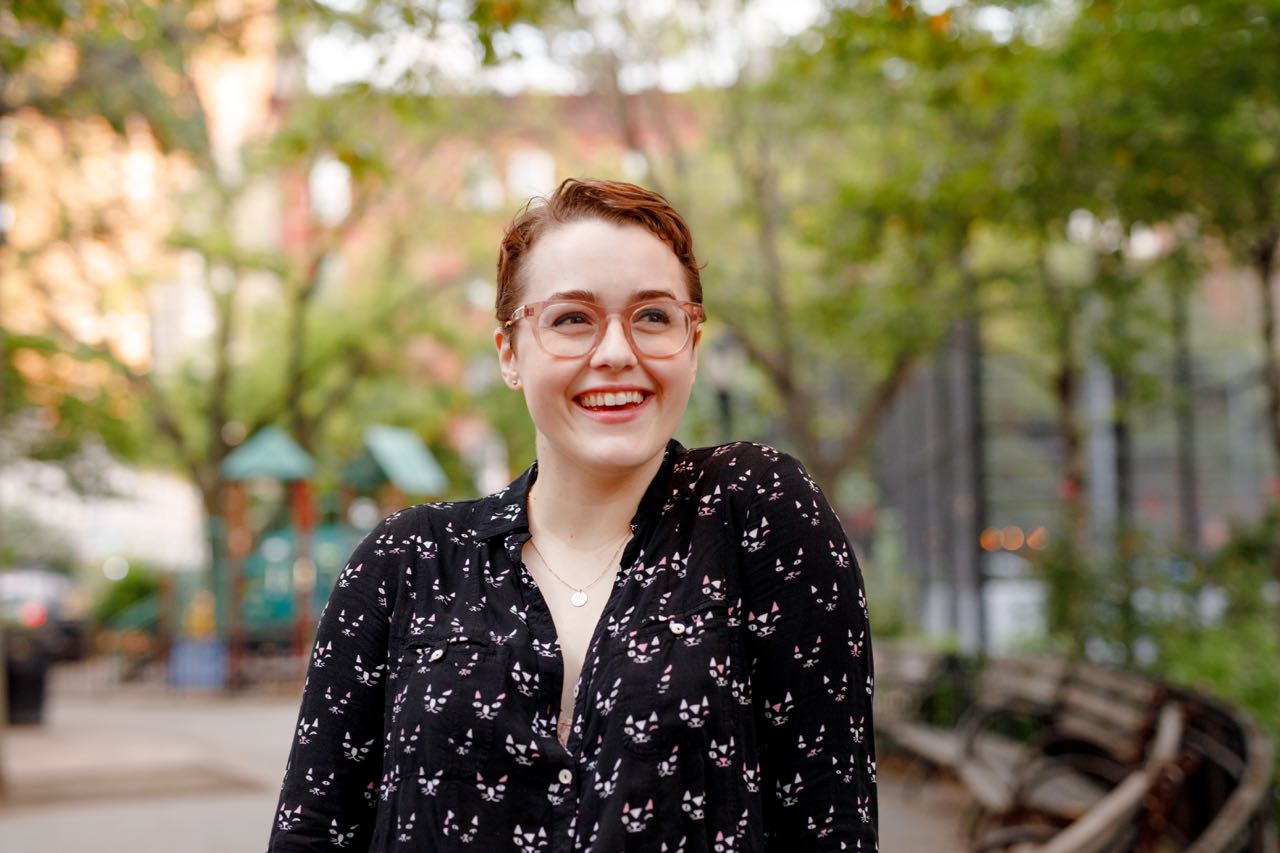
What is your personal relationship like with ambition?
Oh gosh. Low key, high key, it goes back in forth. I feel like I’ve always been a relatively ambitious person. I think it’s just a part of who I am and therefore I forget that I’m as ambitious as I am. It’s like, “Well that’s just my normal. That’s what everyone does, right?” It’s apparently not. I’ve wanted this for a long time, and I’ve worked really hard to get where I am. I’m proud of the work that I’ve done to get where I am. Ambition is hard and scary, but worth it.
You’re in an industry where you’re given so much information about yourself, in terms of typecasting, like,, “I don’t see you as that. I see you as this.” What is that like for you as a person, and as somebody who is still developing as a person, to be put in a box before you even necessarily know who you are? Especially as someone who started in the business young and still is young?
It’s incredibly difficult and saddening and infuriating and frustrating. It is depressing to be told no so many times because of things that you haven’t even figured out about yourself yet, and things you could change, and things that you’re working on. I feel like as actors, we’re constantly told no forever. Every once in a while we get a yes. You have to work really hard to find yourself in all of that, and to find your own joy and your own sense of self worth. Because to go to a million auditions and to have every single one of them be a no, you start to doubt yourself. You start to doubt everything about yourself. Then you have to figure out how to get up the next day and do it again. I’m still trying to figure out how to think of myself in a positive light, because it’s hard sometimes. It’s a constant struggle. You just have to figure out how to surround yourself with good people who you trust and love and find your own way through it. It’s so hard.
What’s the one thing that you wish you had known earlier about this industry and this career that you feel like would have made a big difference to you?
Nothing goes the way you think it’s going to. I feel like growing up and wanting to do this, you have a very clear image in your mind of what it’s going to be like. For me, it was nothing like that, which was disappointing, but also eye-opening, and made it something even more special once I figured it out. It’s not going to be what you expect it to be, but it is going to be incredible.
What is the thing that makes you the most angry about this industry?
People having closed minds. People not thinking outside the box. People assuming it has to be done a certain way when there are actually millions of different ways to do things.
Is there part of you that feels like there are experiences of being young that you’re not going to have, or feel like you aren’t having, because you’re working? Sacrifice is a strong word, but do you ever feel like there are sacrifices in your personal life?
Sacrifice is such a strong word. I don’t look at any of it really as a sacrifice. I have not had a typical growing up at all. I feel like a lot of people outside of this industry would look at my life and be like, “I’m sorry, what?” Where for me, I knew I wanted to do this at a very young age, so I made it happen. I was homeschooled and I only did theatre. I moved to New York when I was 16. I didn’t have friends and I was awkward. I gave up having a normal teen life to follow my passion. A lot of people would be like, “What?” To me, it just felt normal. You “sacrifice” things to follow your dreams and it’s 100% worth it. It doesn’t ever really feel like a sacrifice. But it’s tricky. Finding the balance of work and social life can be super challenging. I don’t think I actually have many friends outside of this industry. When I do, it’s really hard to see them. Right now, for instance, I’m in rehearsal from 10:00 to 6:00, and I usually have press after rehearsal, or I’ve got a fitting, or I have to run lines. I have no free time to see people and then I’m not getting days off. I just never see my friends. I know that someday I’ll be able to see them, but right now, I’m like, “I want to hang out with my people, but I can’t.” That’s okay, because it’s worth it.
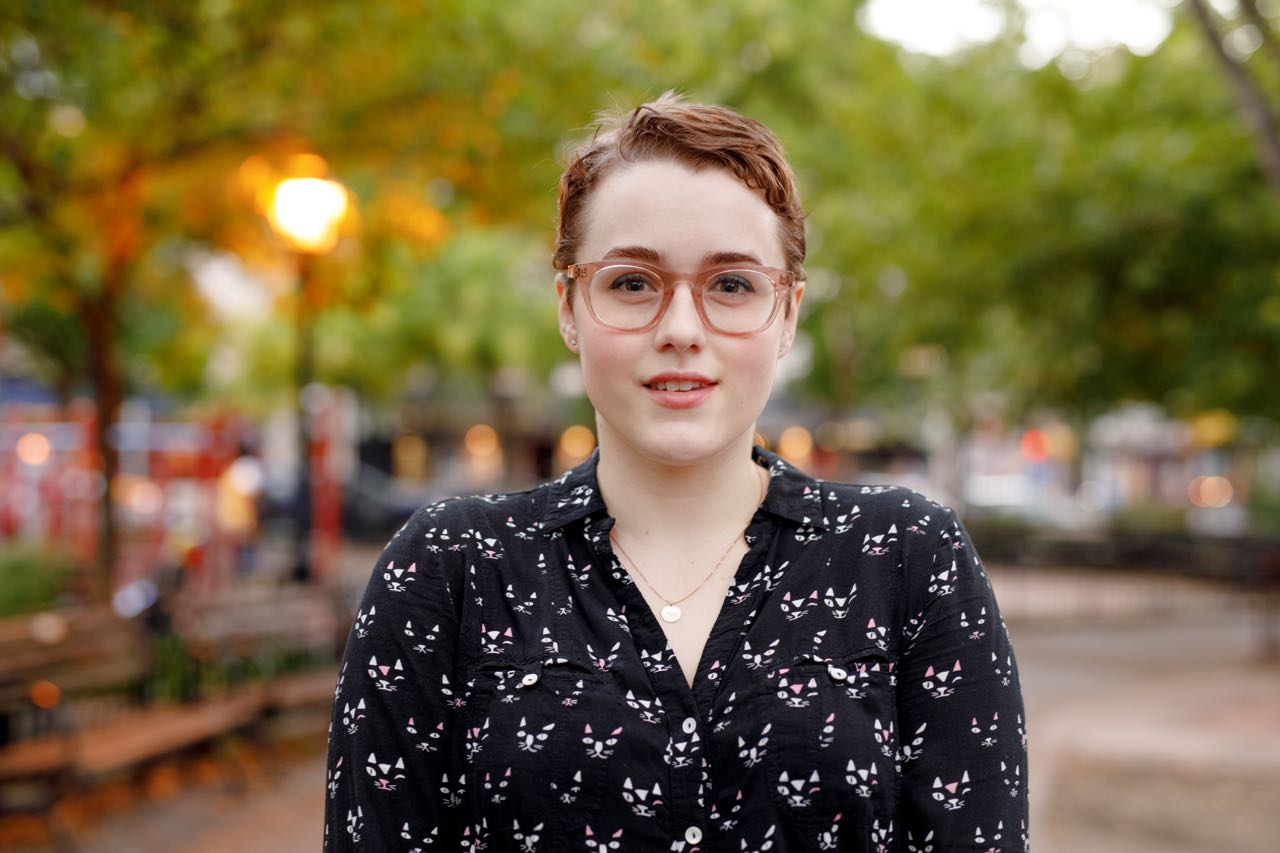
What do you hope audiences take away from The Prom?
I hope that audiences will take away positivity. I hope they will take away an open mind. I hope they will learn to listen more and be more accepting. I hope they leave with a happy and full heart.
For you, over the next couple years, what are you professional goals and dreams?
Just to keep creating theatre and pieces that matter, pieces that can really speak to this generation and the time we live in. I think it’s important for people to have voices. I hope to keep creating art that gives people voices.
Because of this political moment that we’re in, do you feel like your view has shifted in terms of what you want to do and make?
I don’t think it’s shifted my view. I think it has just made my view even stronger. I’ve always felt that we need to bring voices to different people. I’ve always thought that these stories need to be told. Now it’s just stronger. It’s just even more important. It’s reaffirmed my want of that.

